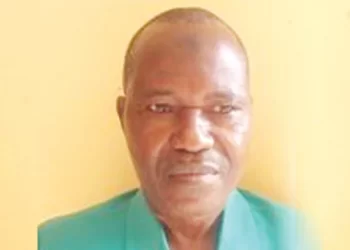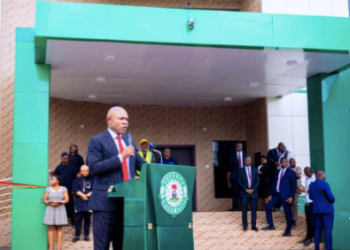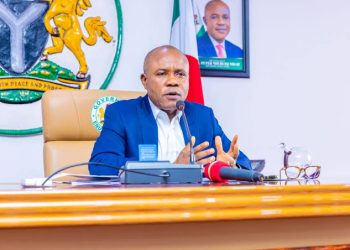By Ngozi Okonjo-Iweala & Janeen Madan
This essay is part of a special edition being published in partnership with Foreign Affairs, titled “African Farmers in the Digital Age.”
This anthology explores the future of African food systems and the role that digital solutions can play in overcoming the isolation of smallholder farmers and speeding up rural development. Look for it at https://www.foreignaffairs.com/anthologies on February 15.
Financial Inclusion Matters for Africa’s Smallholder Farmers
Agriculture forms the backbone of African economies, accounting for 32 percent of gross domestic product (GDP). A majority of the continent’s farmers earn their living on small plots of less than two hectares, which represent 80 percent of all farms across sub-Saharan Africa. But these smallholder farmers are largely excluded from financial services and are therefore constrained from improving their wellbeing and transforming their farms into economically viable businesses. Although smallholder farmers face a number of challenges to raising productivity, bridging the financial access gap must be a priority.
There is much literature on expanding financial inclusion among the world’s poor. The issue has been a development priority since Group of Twenty (G20) leaders launched the Financial Inclusion Action Plan in 2010. But Africa’s smallholder farmers have received little attention, and women farmers—who make up half of the continent’s agricultural labor force—have received even less.
Being excluded from financial services has negative consequences for smallholder farmers. Access to credit can help raise farm productivity by expanding access to inputs as well as better storage, marketing, and processing. Access to savings instruments at harvest enables families to put money aside and helps smooth consumption at other times of the year. Access to payment platforms can offer a secure and efficient way to make transactions. And access to insurance products can protect against illness and weather-related shocks. In the absence of these formal mechanisms, smallholder households often rely on informal instruments. Although they are accessible and flexible, informal financial services can also be inefficient and costly in the short term, and they do not always offer the services needed to help transform subsistence farming into a profitable business.
Understanding farmers’ needs, and the range of financial services they rely on to meet those needs, must be the first step. But translating this knowledge into tailored products will be even more critical. While evidence is still emerging, digital solutions are at the forefront of these efforts.
Smallholder Farmers Are Excluded From Financial Services
Large gaps remain in meeting the financial needs of smallholder farmers across sub-Saharan Africa. The Global Financial Index, or Global Findex, underscores the extent of their exclusion from the formal financial sector. Across forty-two African countries in 2014, only 29 percent of adults in rural areas had a mobile money account or an account at a bank or microfinance institution (MFI), compared to 34 percent at the national level. Although access to bank accounts in rural areas remains low, this represents an increase from 24 percent in 2011. Poor households and women are even more excluded than the rural population generally. Poorer households are much less likely than richer households to have a formal account (25 percent compared to 41 percent), and there is also a significant gap between women and men (30 percent compared to 39 percent).
While more than half of all rural households saved and borrowed money over the past year, only a small percentage used the formal sector. Among those who reported saving, 13 percent saved at a bank or an MFI, and 25 percent saved with a community savings group. The majority saved money under the mattress or in tangible assets such as livestock. Rural households are also excluded from formal sources of credit; only 6 percent borrowed from a formal institution. Forty-two percent of those who reported borrowing turned to family and friends, and 5 percent borrowed from an informal lender, such as a trader or processor. Because they are borrowing informally, the interest rates are usually between two and ten times higher than commercial rates. Furthermore, only slightly over 6 percent of farmers reported purchasing crop or livestock insurance. Finally, a majority of farming households received payments from agricultural sales in cash; only 8 percent received payments via mobile phone, and 7 percent received money directly to a bank or MFI account.
Demand and Supply Barriers Limit Access to Formal Financial Services
A number of demand- and supply-side constraints explain why smallholder farmers are excluded from formal financial services. On the demand side, smallholder households cannot always afford fees or minimum balance requirements to keep accounts active. In Uganda, for example, annual account maintenance fees are almost 25 percent of GDP per capita. Rural clients must travel long distances to reach bank branches; to do so, they have to pay for transportation and forego daily wages. In addition, farmers do not always have the formal documentation, such as identification cards and land titles, required to open an account. There is also evidence of a lack of trust in financial institutions and low financial knowledge among the poor. For smallholder farmers in particular, the repayment cycles for standard bank and MFI loans often do not align with seasonal cash flows. Finally, gender dynamics further constrain women’s access: Given multiple household responsibilities, women are often time constrained, which limits their ability to engage with formal financial services. Women also lack formal land titles, even more so than men.
On the supply side, smallholder households are expensive to serve because a majority live in rural areas. And because agriculture is highly susceptible to weather shocks, financial providers perceive farmers as too risky to lend to. In addition, formal financial institutions often lack information about the credit histories of poor rural farmers, as well as the knowledge and capacity to serve agricultural households. Lenders sometimes fail to see farmers as a substantial source of savings and have therefore not traditionally marketed specific products to them.
Digital Innovations Are Helping to Bridge the Gap
Digital technology has the potential to address multiple demand and supply barriers by offering a new delivery platform to reach underserved clients. Mobile connectivity is rapidly expanding across sub-Saharan Africa; a 2014 Pew Research Center survey in seven African countries found that roughly 80 percent of people own mobile phones. Mobile platforms can allow clients to access bank accounts more easily, and also reduce delivery costs for service providers.
To effectively close the gap in the availability of financial services, it is essential that digital products meet the unique financial needs of smallholder farmers. Digital by itself is not enough. Therefore, a complete understanding of these households’ financial needs must be a priority. The Consultative Group to Assist the Poor (CGAP), housed at the World Bank, has focused much-needed attention on smallholder farmers. Through its Financial Diaries of Smallholder Households project, CGAP aims to better understand how farmers in Mozambique, Tanzania, and Pakistan use financial services. Initial findings show that while smallholder households rely on multiple sources of income, including wage labor and off-farm businesses, agriculture accounts for 40 percent of earnings.
However, findings also suggest that income from agriculture is seasonal, creating unique cash-flow challenges. Farmers receive a bulk of their income at harvest, making it difficult to cover expenses for school fees, health care, and religious celebrations throughout the year. Farmers require capital at the start of the planting season to purchase seed and fertilizer. During the growing season, households must stretch available resources until the next harvest. Income from agriculture can also be risky; crops are susceptible to weather fluctuations, pests, and disease. Considering these diverse needs, financial services for smallholder farmers must move beyond credit for agriculture and include insurance, savings, and transfers to smooth consumption. This approach can help ensure financial instruments have a transformative role on the lives of smallholder farmers.
A suite of digital financial innovations for smallholder farmers has cropped up across the continent. These examples are neither exhaustive nor fully proven in their impact. But they nevertheless highlight the tremendous potential to connect Africa’s smallholder farmers to financial services by addressing both demand- and supply- side barriers.
In one model that addresses demand-side constraints, financial institutions are rolling out branchless banking to serve rural clients. For example, Opportunity International hires agents who drive to rural areas and use mobile phones to register new clients, deposit savings, and collect loan payments. In addition, mobile bank accounts are expanding across the continent, most rapidly in East Africa. M -Shwari in Kenya and M-Pawa in Tanzania allow M-Pesa clients to take out loans and make interest-earning savings deposits. Using a secure and familiar platform, rural clients do not have to travel to access accounts, pay fees, or meet minimum balance requirements. These are all important factors that can underpin widespread adoption.
But there are still challenges in reaching the rural poor, including limited network coverage and low financial literacy. Furthermore, recent evidence shows that although account ownership has increased, regular use has lagged. Therefore, products should be designed to meet smallholder farmers’ needs to help ensure that that they adopt and use them. To address low financial literacy, for example, the nongovernmental organization TechnoServe trains smallholder farmers in Tanzania on how M-Pawa accounts work in order to encourage the farmers to use them.
Other programs are using mobile platforms to deliver credit and savings products specifically designed for smallholder farmers. For example, One Acre Fund has developed an asset-finance model with a flexible repayment schedule that helps over two hundred thousand farmers in Kenya, Rwanda, Burundi, and Tanzania purchase high-quality inputs at the start of the planting season. Farmers make a prepayment (10 percent of the loan) prior to receiving inputs and have the flexibility to repay the remaining loan amount in any increment on any schedule, as long as they repay fully by harvest time. In countries like Kenya, where the mobile money infrastructure is well developed, farmers make repayments via M-Pesa. This loan product has helped farmers increase their earnings per acre by 50 percent.
In addition, access to savings can play an important role. MyAgro, a mobile platform, offers a commitment savings device to farmers in Mali and Senegal. Rather than paying a lump sum to purchase seeds and fertilizer at the start of the planting season, farmers save small amounts throughout the year. Clients buy MyAgro scratch cards from local stores and make deposits into their savings accounts, just like buying credit for a mobile phone. Clients of MyAgro have increased their harvests, and raised their incomes by more than 70 percent compared to non-client farmers. Both these uniquely tailored products could serve as effective models for financial service providers.
Digital technology can also be leveraged for payment transfers. Nigeria’s mobile wallet program, established in 2012 by the Central Bank and Ministry of Agriculture, has digitized voucher distribution for subsidized fertilizer. The platform’s fourteen million subscribers can use electronic vouchers to buy subsidized fertilizer from local agro-dealers. This platform is playing a critical role in connecting farmers to the formal banking system, and it has helped reduce corruption in fertilizer distribution by wiping out middlemen. Between 2013 and 2014, Nigeria’s Ministry of Finance also provided additional budgetary incentives that enabled the Ministry of Agriculture to scale up the mobile wallet program’s reach to an additional 2.5 million women farmers.
According to CGAP, the mobile wallet platform reaches twice as many farmers as the previous distribution system at one-sixth of the cost. The Nigerian government has also established a mechanism to encourage financial institutions to lend to the agriculture sector. The Nigerian Incentive-Based Risk Sharing System for Agricultural Lending (NIRSAL) addresses an important supply-side constraint by providing a credit risk guarantee that covers between 30 and 75 percent of incurred losses on loans. NIRSAL enables the financial sector to expand its client base, and smallholder farmers and small and medium-sized agribusinesses gain access to financial services.
Keeping Up the Momentum
Promising innovations across the continent are leveraging the broad reach of digital technology to connect farmers to the formal financial sector. Ongoing research is providing rigorous evidence to better understand how these services are affecting smallholder households. There is no silver bullet and the gaps are still large, but there is tremendous international momentum around the issue of financial inclusion. Bringing Africa’s smallholder farmers into the spotlight and expanding their access to financial services will be critical to achieving universal financial inclusion and accelerating smallholder farmers’ contribution to the continent’s economic growth.
Author’s Personal Story
As a child, I spent Saturdays accompanying my widowed grandmother on the very long trek to her farming plots. We would set out before sunrise, me carrying water and her carrying food and implements, like small hoes and machetes. The main job was weeding between the mounds of yam. If they were in good shape, we would turn to the adjoining maize and vegetable plots. Lunch was roasted yam or plantain with palm oil and red pepper, which is still one of my favorite meals. I’d overhear my grandmother talking with other farmers about something called fertilizer or about new varieties of cassava and maize that could double output. But they had neither the money nor the know-how to make use of these tools.
From the time I left Nigeria to study economics, I was always trying to figure out what could be done to make farmers’ lives better.
For my doctoral thesis I chose the topic of “Rural Financial Markets in Nigeria” and spent months living with rural households all over the country to understand their savings, borrowing, and consumption patterns. That was from 1979 to 1981. While numerous experiments in recent years have yielded promising solutions, the work won’t be done until we’ve revolutionized the lives of African smallholders.















































